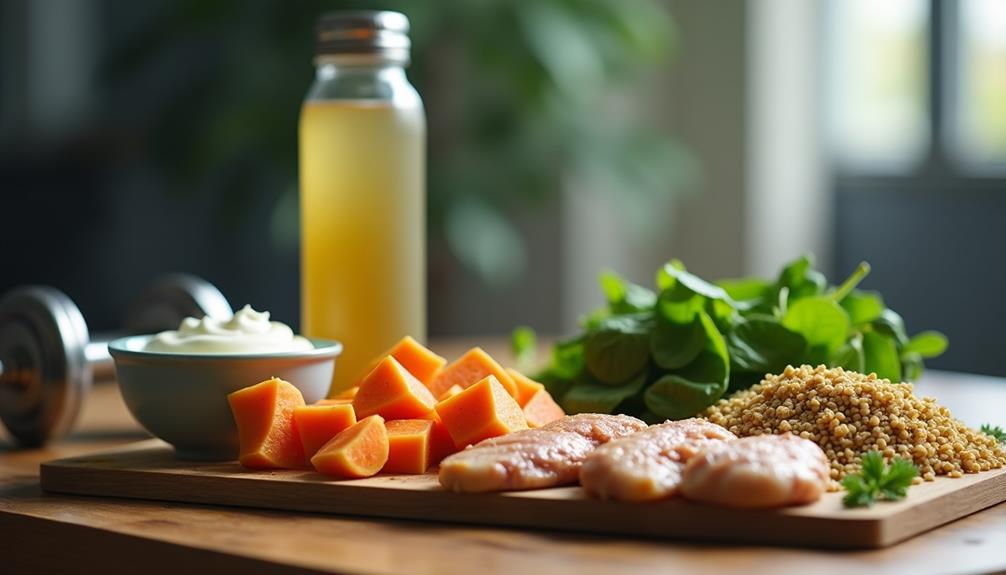To boost muscle growth after hypertrophy training, focus on these top five recovery foods. Greek yogurt offers protein and probiotics for digestion. Quinoa is rich in fiber and essential nutrients, perfect for energy replenishment. Salmon provides high-quality protein and omega-3 fatty acids, reducing inflammation. Sweet potatoes are packed with carbohydrates and vitamins, aiding recovery. Finally, eggs deliver complete protein with all essential amino acids. Incorporate these foods into your meals to optimize recovery and muscle repair. If you want to explore more about their benefits and how to use them effectively, more insights await you.
Core Insights
- Greek yogurt provides high protein content and live cultures for muscle growth and gut health, making it an ideal post-workout snack.
- Quinoa is rich in fiber, vitamins, and minerals, supporting digestion, energy production, and muscle function post-hypertrophy training.
- Salmon is loaded with quality protein and omega-3 fatty acids, helping reduce inflammation and aid in muscle repair after intense workouts.
- Sweet potatoes offer carbohydrates to replenish glycogen stores and are high in vitamins A and C, which support recovery and overall health.
- Eggs contain all essential amino acids and provide high-quality protein, vitamin D, and B vitamins critical for muscle repair and energy metabolism.
Greek Yogurt
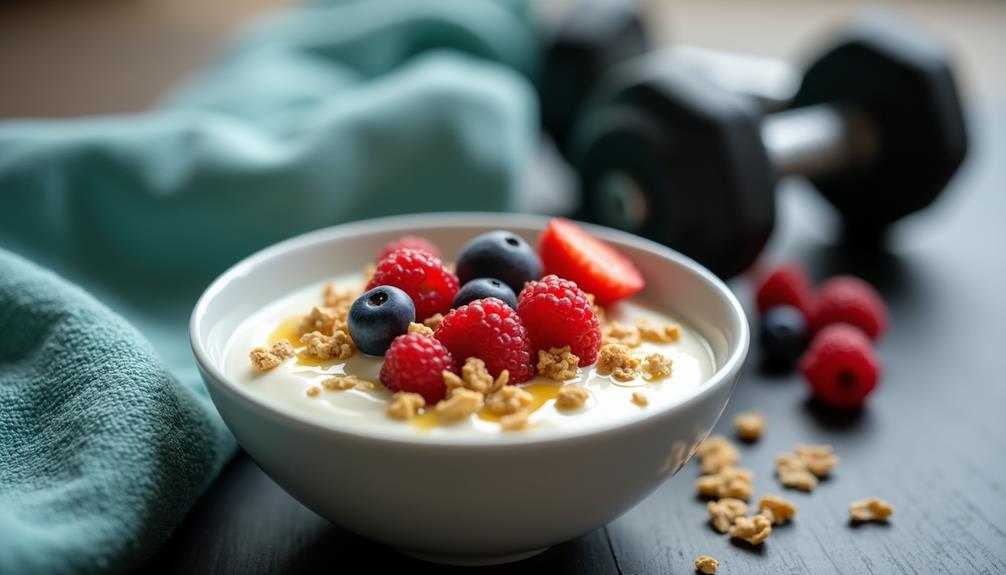
Greek yogurt is a powerhouse when it comes to recovery foods for muscle growth. It's packed with protein, essential for repairing and building muscle tissue after intense workouts. A typical serving contains around 10 grams of protein, making it an excellent post-exercise snack. For those looking to boost their protein intake even further, adding a scoop of gluten-free protein powder can notably increase the protein content while maintaining a creamy texture.
The live cultures in Greek yogurt also promote gut health, which can aid in nutrient absorption. This is essential because your body needs to efficiently utilize the nutrients you consume. Plus, it's versatile—mix it with fruits, nuts, or honey for added flavor and nutrients.
Incorporating Greek yogurt into your diet can support your recovery process, helping you maximize your gains. So, grab a cup after your workout and give your muscles the boost they need.
Quinoa
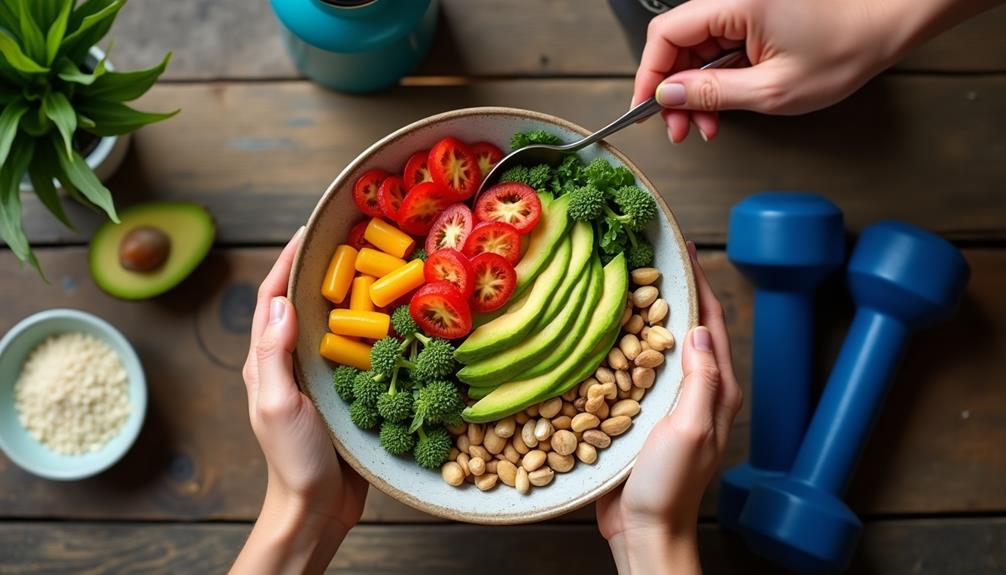
- High in Fiber: Quinoa aids digestion and keeps you feeling full longer, which can help with weight management. While quinoa is an excellent source of nutrients, some individuals may prefer meal replacement powders for convenience or specific dietary needs. These powders can offer similar benefits in a more portable form.
- Rich in Vitamins and Minerals: It contains magnesium, iron, and B-vitamins, which support energy production and muscle function.
- Versatile Ingredient: You can easily add quinoa to salads, bowls, or as a side dish, making it a convenient option for any meal.
Incorporating quinoa into your diet can enhance your recovery process and promote muscle growth.
Salmon
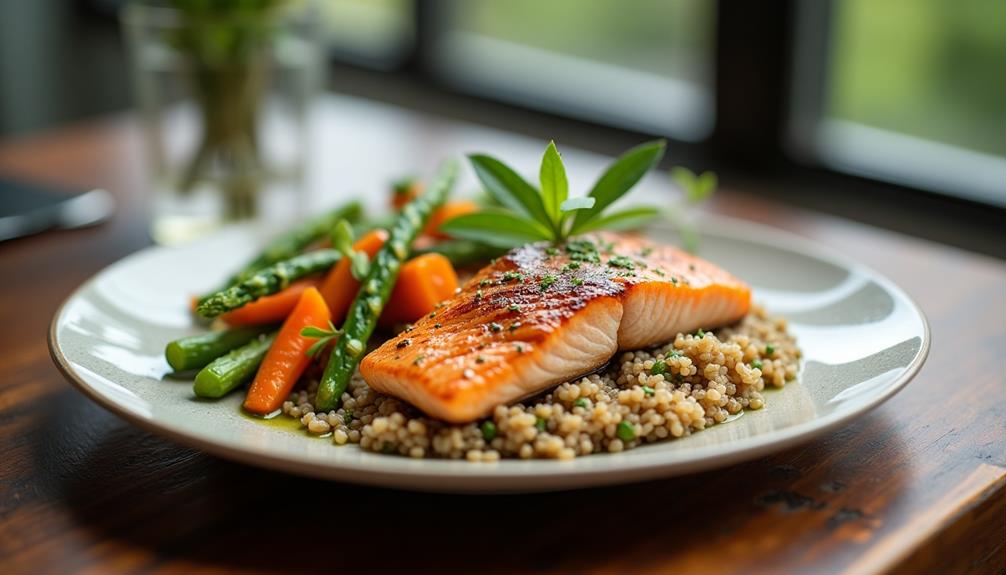
When it comes to recovery foods for muscle growth, salmon is a standout choice. This fatty fish is loaded with high-quality protein, essential for repairing and building muscle tissue after your workouts. Each serving provides omega-3 fatty acids, which can help reduce inflammation and promote faster recovery. Like protein bars, salmon offers a good balance of protein and healthy fats, making it an excellent option for post-workout nutrition. The protein content in salmon aligns well with the recommended 15-30g intake for best muscle recovery and growth.
Additionally, salmon contains important vitamins and minerals, such as vitamin D and selenium, that support overall health and muscle function. You can easily incorporate it into your meals by grilling, baking, or adding it to salads. Pair it with other nutritious foods to create a balanced post-workout dish. By choosing salmon, you're not just fueling your body; you're also setting the stage for top-notch muscle growth and recovery after hypertrophy training.
Sweet Potatoes

Sweet potatoes are a powerhouse of nutrients that can greatly enhance your muscle recovery. They're not just tasty; they're packed with benefits that support your fitness goals. Here are three reasons to include them in your post-workout meal:
- Abundant in Carbohydrates: Sweet potatoes provide complex carbs that replenish glycogen stores, essential for recovery after intense training.
- Packed with Vitamins: They're high in vitamins A and C, which help reduce inflammation and support overall health.
- Rich in Fiber: The fiber content aids digestion and keeps you feeling full, helping you maintain energy levels throughout the day.
Incorporating sweet potatoes into your diet can greatly contribute to your muscle recovery process and overall health.
Eggs
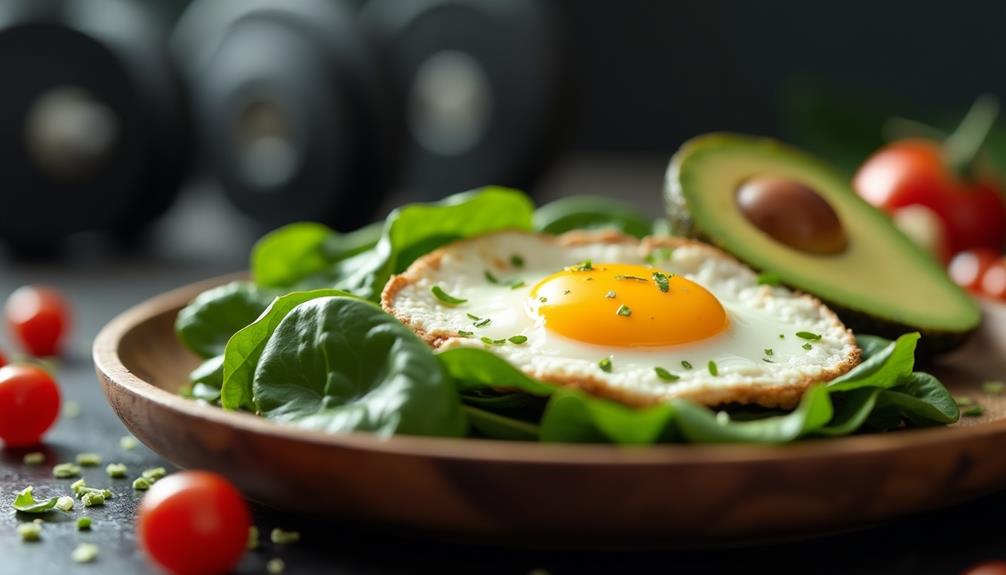
Eggs pack a powerful punch when it comes to muscle recovery, making them a staple in many athletes' diets. They're rich in high-quality protein, which is essential for repairing and building muscle tissue. Plus, they contain all nine essential amino acids your body needs.
Here's a quick breakdown of the benefits:
| Nutrient | Amount per Egg | Benefit |
|---|---|---|
| Protein | 6 grams | Aids muscle repair |
| Vitamin D | 41 IU | Supports muscle function |
| B Vitamins | Various | Boosts energy metabolism |
Including eggs in your post-workout meal can speed up recovery and enhance muscle growth. Whether scrambled, boiled, or poached, they're versatile and nutritious, making them an excellent choice for your recovery plan.
Frequently Asked Questions
How Often Should I Eat These Recovery Foods for Optimal Muscle Growth?
To optimize muscle growth, you should eat recovery foods after your workouts and include them in meals throughout the day. Aim for balanced nutrition every 3-4 hours to support ongoing recovery and muscle development effectively.
Can I Substitute These Foods With Alternatives for Muscle Recovery?
You might feel torn between your favorite snacks and recovery foods. Sure, you can substitute them, but make sure those alternatives pack the same nutrients. Balance enjoyment and effectiveness for best muscle recovery and growth.
What Is the Ideal Portion Size for Each Recovery Food?
When considering portion sizes, aim for balance. For protein, about 20-30 grams works well. Carbohydrates should be roughly 40-60 grams. Adjust these amounts based on your individual needs, activity level, and specific recovery goals.
Are There Any Allergens in These Recovery Foods to Consider?
Yes, you should consider allergens like dairy, nuts, or gluten in recovery foods. Always read labels and check for cross-contamination. If you have allergies, opt for alternatives that suit your dietary needs without compromising recovery.
How Do These Foods Compare in Cost and Availability?
Comparing these foods is like shopping for shoes; prices vary, and availability changes based on your location. You'll find some options more budget-friendly than others, depending on seasonality and local grocery stores' stock.

